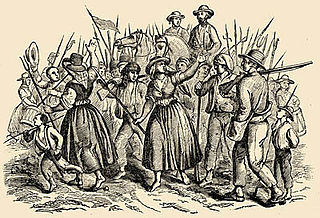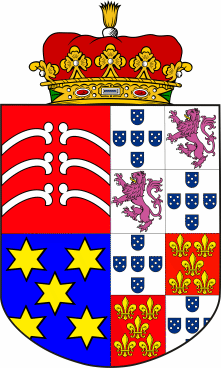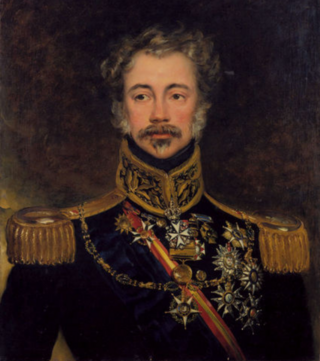
Dona Maria II "the Educator" or "the Good Mother", was Queen of Portugal from 1826 to 1828, and again from 1834 to 1853. Her supporters considered her to be the rightful queen also during the period between her two reigns.

DomMiguel I, nicknamed "the Absolutist", "the Traditionalist" and "the Usurper", was the King of Portugal between 1828 and 1834. He was the seventh child and third son of King John VI and Queen Carlota Joaquina.

José Lúcio Travassos Valdez, only Baron and first Count of Bonfim, was a Portuguese soldier and statesman.

Duke of Saldanha is a Portuguese title granted by royal decree of Queen Maria II of Portugal, dated November 4, 1846, to João Carlos Saldanha de Oliveira Daun (1790-1876), also known as Marshal Saldanha, leader of the liberal armies, during the Liberal Wars in Portugal.

The history of the kingdom of Portugal and the Algarves, from the First Treaty of San Ildefonso and the beginning of the reign of Queen Maria I in 1777, to the end of the Liberal Wars in 1834, spans a complex historical period in which several important political and military events led to the end of the absolutist regime and to the installation of a constitutional monarchy in the country.
The highest hereditary title in the Portuguese nobility. By tradition, there are a total of five royal and seven non-royal dukes in Portugal, out of 28 dukedoms that have ever been created. In the majority of cases, the title of duke was attributed to members of the high nobility, usually relatives of the Portuguese royal family, such as the second son of a monarch.

D. Pedro de Sousa Holstein, 1st Duke of Faial and Palmela was one of the most important Portuguese diplomats and statesmen in the first half of the 19th century. He also served as the country's first modern Prime Minister.

Luís da Silva Mouzinho de Albuquerque was a Portuguese military officer, engineer, poet, scientist and politician, who distinguished himself during the Liberal Wars and in the conflicts that marked Portugal's history in the first half of the 19th century. He served as the Minister of the Kingdom during the liberal regency of Pedro of Braganza. This was the most prominent post inside the government at that time, which made him the Prime Minister of Portugal in all but name. He was also several times minister and deputy minister during the Constitutional Monarchical period. Among other offices, he served as Chief of the National Mint, captain-general and governor of Madeira, and inspector-general of public works. He was the grandfather of Joaquim Augusto Mouzinho de Albuquerque, a military officer and colonial administrator.

The Patuleia, Guerra da Patuleia, or Little Civil War was a civil war in Portugal, so called to distinguish it from the 'great' civil war between Dom Pedro and Dom Miguel that ended in 1834. The Patuleia occurred after the Revolution of Maria da Fonte, and was closely associated with her. It was caused by the nomination, as a result of the palace coup of 6 October 1846, known as the "Emboscada", to set up a clearly Cartista government presided over by marshal João Oliveira e Daun, Duque de Saldanha.

The Revolution of Maria da Fonte, or Revolution of the Minho, is the name given to a popular revolt in the spring of 1846 against the Cartista government of Portugal. The revolt resulted from social tensions remaining from the Liberal Wars, exacerbated by great popular discontent generated by new military recruitment laws, fiscal alterations and the prohibition on burials inside churches. It began in the area of Póvoa de Lanhoso (Minho) by a popular uprising that little by little extended to the whole north of Portugal. The instigator of the initial riots was a woman called Maria, native of the freguesia of Fontarcada, who would become known by the nickname of Maria da Fonte. As the initial phase of the insurrection had a strong female element, she ended up giving her name to the revolt. The uprising afterwards spread to the remainder of the country and provoked the replacement of the government of Costa Cabral by one presided over by Pedro de Sousa Holstein, 1st Duke of Palmela. When queen Maria II dismissed that government in a palace coup, known as the Emboscada (Ambush), on October 6 that year, and instead nominated marshal João Francisco de Saldanha Oliveira e Daun, 1st Duke of Saldanha to form a new one, the insurrection was reignited. The result was a civil war of 8 months, known as the Patuleia, that was only ended by the signing of the Convention of Gramido on 30 June 1847, after the intervention of foreign military forces from the Quadruple Alliance.

DomJoão Afonso da Costa de Sousa de Macedo was the 2nd Count of Mesquitela and 1st Duke of Albuquerque. Born and died in Lisbon, he was son of Luís da Costa de Sousa de Macedo e Albuquerque, the 1st Count of Mesquitela and Maria Inácia de Saldanha Oliveira e Daun, from the family of Marquis of Pombal.

The Duke of Palmela is a Portuguese title granted by royal decree of Queen Maria II of Portugal, dated from October 18, 1850, to Dom Pedro de Sousa Holstein (1781–1850), a Portuguese politician during the first half of the 19th century. He was President of the Council of Ministers and a remarkable Ambassador in London and to the Congress of Vienna.

João Carlos Gregório Domingos Vicente Francisco de Saldanha Oliveira e Daun, 1st Duke of Saldanha was a Portuguese marshal and statesman.
Events in the year 1853 in Portugal.
Events in the year 1846 in Portugal.
Events in the year 1847 in Portugal.

Maria Luísa de Sousa Holstein, 3rd Duchess of Palmela was a member of the Portuguese nobility who became known for her sculptures, which were exhibited at the Paris Salon, as well as for her charitable work, which included the establishment of soup kitchens for the poor of Lisbon.













